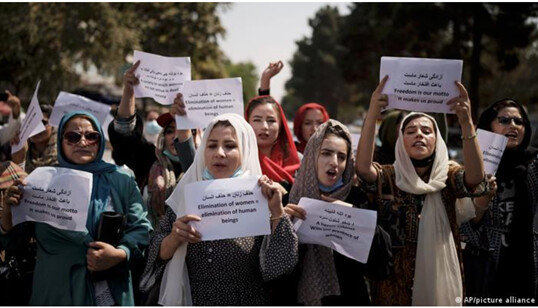Life under Taliban rule: Women and girls in Afghanistan

After decades of re-earned freedom, women and girls in Afghanistan woke up to a new reality in the wake of the Taliban take-over of the capital of Kabul. As the new regime promised to allow women continued access to education and work, including in government positions, the world has yet to see how the new leadership will deal with women’s rights. This article summarizes what international media has reported on this issue since the event took place on August 15.
In contrast to the previous Taliban rule in the 1990s, when women were banned from working and education, couldn’t live their home without a male relative and had to wear an all-covering burqa, this time the Taliban are promising greater freedom for women. But so far, the outlook looks grim. As soon as they took office, the Taliban has set up an all-male interim government and replaced the ministry of women’s affairs with a ministry for “the propagation of virtue and the prevention of vice”, to ensure that sharia law is implemented throughout the country.
As schools re-opened, only boys and male teachers were allowed in the classrooms, and eventually some of the younger girls too. But older girls in secondary education are still kept at home. Working women have been told to stay at home unless their jobs cannot be filled by a man, most recently those holding municipal jobs in Kabul. Female sports players (or those among them who could) massively fled the country as soon as news of the take-over broke. Women are now banned from playing sports.
More than 200 female judges around the country are in hiding as Taliban men whom they have committed to prison prior to the take-over threaten to have their revenge. A similar crackdown against female police officers is under way, with at least four women, including a pregnant mother, targeted and killed by Taliban fighters.
Shelters for abused women have been closed and women housed there have been sent home to their abusers or to prison. Single mothers, whose lives have always been marred by stigma, now face losing their children, as the Taliban disapprove of a woman taking care of children outside of marriage. Divorced and single women who live alone have a particularly hard time because they do not have a male relative to accompany them outside, causing them to be trapped at home or risk punishment.
Afghan women have not remained silent, and the Taliban met with some bold public challenge by female activists, notably in Kabul. Reuters counted at least eight serious protests organized by women in the month after the take-over. Women staged protests in response to the announcement for an all-male government and to being told that female government employees will no longer go to work. Taliban fighters used whips and gunfire to disperse them. A virtual protest spread on the social media under the hashtag #DoNotTouchMyClothes, where Afghan women posed in colorful outfits in response to efforts on the part of the Taliban to control the way women dress. As the Taliban banned unannounced demonstrations and following the violent crackdown on earlier protests, it has become increasingly difficult for women to voice their concerns in the street. Protests are not banned altogether, but those wanting to hold demonstrations needed to seek prior permission and provide details of place, timings and slogans that would be chanted. We have yet to see whether women’s cries and the pressure from the international community will have any impact on lives of women and girls under the Taliban.
Cover photo: Women protest in Kabul against restrictions introduced by the new Taliban regime since 25 August 2021. Source: DW
is a Marie Curie fellow in the European Joint Doctorate MOVES (Migration and Modernity: Historical and Cultural Challenges). She is based at Paul Valery 3 University in Montpellier, France and Charles University in Prague. Her doctoral research examines discourses on immigrant integration to understand how “integration” is imagined by various social actors.